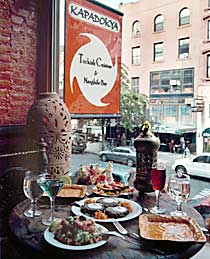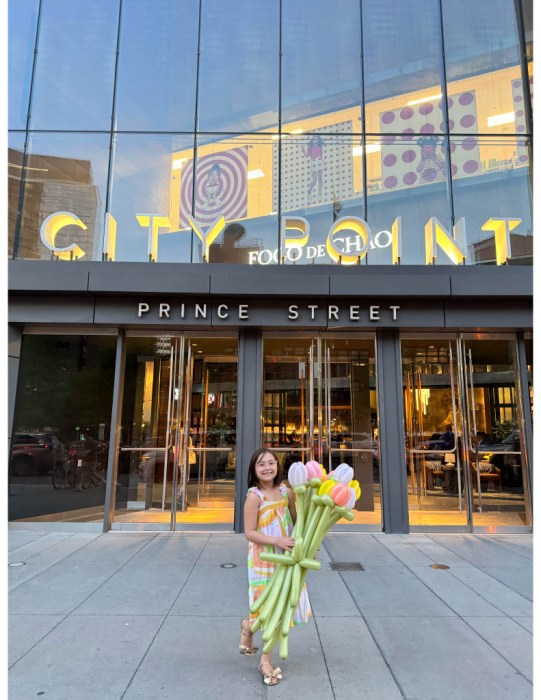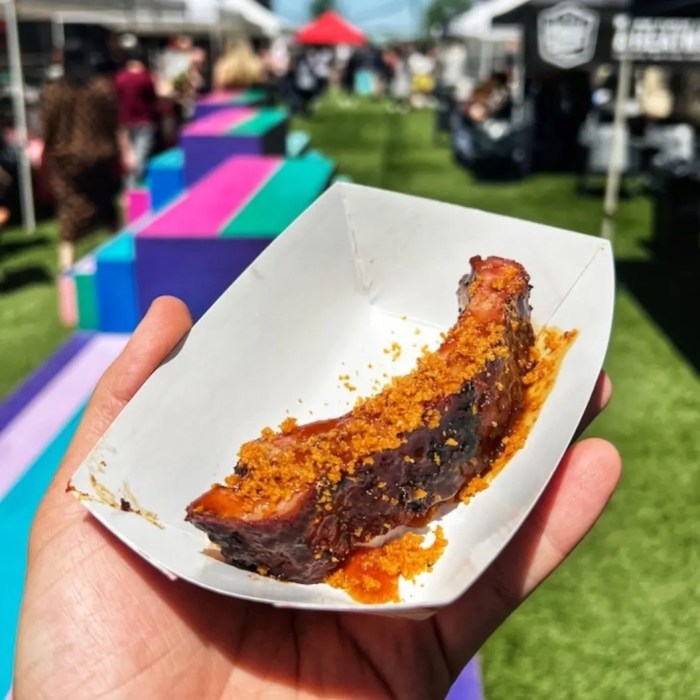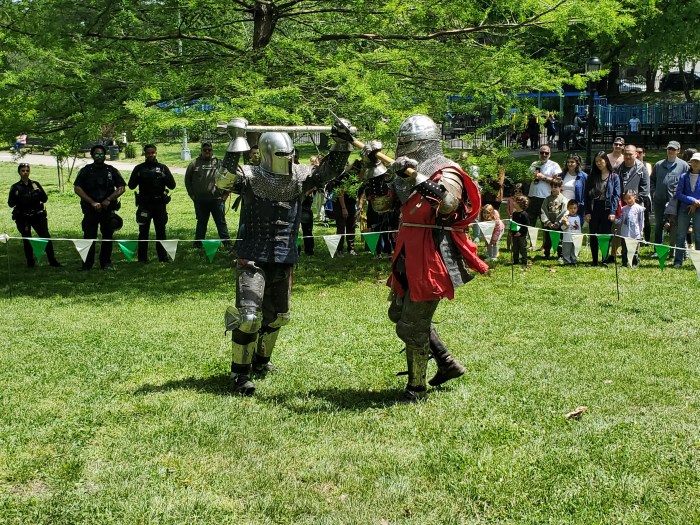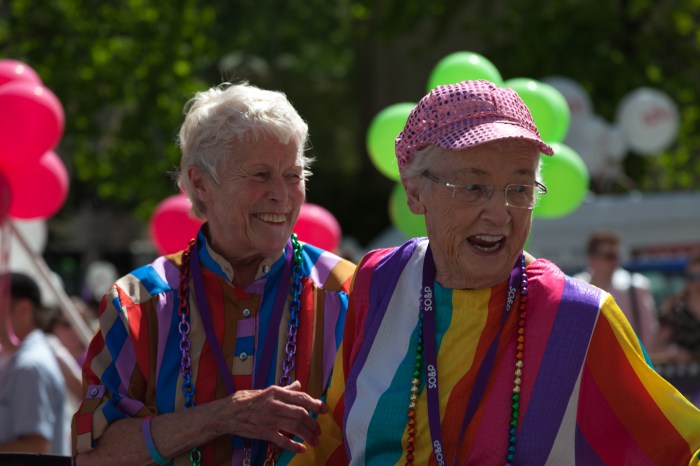On a trip to Turkey, my friend Sarah and
I ate meals that were pure, simple, often transcendent, and quite
repetitive. We never tired of breakfasting on bread, mild cheese,
honey and olives. But we had our fill of lentil soup and cheese-filled
pastries, and didn’t care to revisit the cuisine for a while
after our return to Brooklyn.
Then Kapadokya opened.
This second-floor restaurant on the Montague Street strip in
Brooklyn Heights has taken on the mission of transporting diners
to Turkey. On a recent Friday night, Sarah and I were not the
only people eager to travel up the rose petal-strewn staircase
to Kapadokya. Both the dining room and narghile (hookah) patio
were packed. (Thursday through Saturday there is a popular belly
dancing performance in the evening.)
Large parties were feasting on platters of hummus, stuffed grape
leaves and other appetizers, or meze. By the tall front windows,
diners sat on low chairs at small Turkish tables, enjoying romantic
dinners for two, giddy girls’ nights out or quiet family meals.
A hostess in a multicolored Turkish jacket greeted us with the
kind of warmth we remarked upon often during our Turkish travels.
As soon as we were seated, a waiter, also in traditional dress,
set down a dish of oil-cured olives and a basket of pita. We
admired the airy dining room, with it’s colorful glass lanterns,
and reminisced about terrible wines we’d encountered in Turkey.
Kapadokya serves six very enjoyable wines, including a Turkish
white, Çankaya, and a Turkish red, Yakut.
As we perused the menu, Sarah recalled our theory that Turkish
cuisine aims to prepare eggplant in as many ways as possible.
At Kapadokya, chef Necati Solgoel presents this meaty, sweet
vegetable in several guises, including a purist’s puree, Patlecan
salad, where it’s blended with garlic, olive oil and lemon. In
another recipe (called Imam Bayildi, "The Priest Fainted"),
halved baby eggplant is stuffed with tomato and onions and simmered
in so much olive oil that it caused a proverbial priest to swoon.
Sadly, the kitchen was out of this legendary dish.
For our meze, we thwarted the chill of a rainy night with hot
appetizers. Sigari Böregi, rolled phyllo pastries, were
fried, filled with either a firm, salty cheese or spinach, subtly
flavored by parsley, mint and dill.
Zucchini pancakes (Mücver) resembled my mother’s potato
pancakes. The patties of grated zucchini were pan fried until
darkly browned outside, while still creamy and mild inside. Generously
drizzled with a garlic-and-dill-spiked yogurt sauce, even zucchini
skeptics could appreciate this presentation.
Before the main course, 8:30 pm struck, and the much-hyped belly
dancer emerged in a shimmer of gold sequins, rhythmically plying
finger cymbals as she swayed and gyrated. Dancer Jeanette Anhell’s
graceful performance would fit right into a Disneyland Arabian
Night. Almost everyone tucked dollar bills into her sequined
belt.
Thus refreshed, we tucked into the main course. My baked trout
with tomato and cheese (Alabalik) looked like a shallow lasagna
with a head and tail. It tasted that way, too. Salty cheese and
tangy, garlicky tomato sauce caused the decent, if slightly dry,
trout to play a supporting role. Beyond its inherent fishiness,
the trout mainly served as texture in this hearty dish.
Sarah’s Hünkar Begendi, or Sultan’s Delight, was described
as "a classic Ottoman dish made with baked chunks of chicken
or lamb on top of creamy eggplant puree." The menu neglects
to mention that the smooth eggplant is impossibly smoky, reminiscent
of the wild smell of campfire meals. This haunting depth was
brightened by a sharp tomato sauce. Almost as an afterthought,
the plate was studded with cubes of lamb, which Sarah found bland.
Still, I was won over by a cuisine with so many ingenious ways
to bring out the flavors, textures and aromas of vegetables.
If the main protein on our plates lacked oomph, this was more
a difference of emphasis than a fault. On future visits, I plan
to shift my emphasis, concentrating most on the meze, where Kapadokya
really excels.
I’ll eat tapas-style on the narghile patio, which feels more
Mediterranean than Brooklyn. I’ll forgo wine in favor of anise-flavored
raki, a clear liqueur that clouds when cut with water. My smoker
friends will puff away, perhaps trying the hour-long experience
of smoking a hookah of flavored tobacco ($13.95, dinner only).
When I come again, I’ll definitely have the thick milk custard
that Sarah ordered. It wobbled as our waiter put it down, with
a burnt top that outdoes creme brulee, echoing the smoky flavors
of the meal and perfectly balancing the sweet comfort of the
custard. My baklava was fine – sweet with honey, and nutty with
ground pistachios – yet the layers of pastry were under-baked.
Tea drinking was an important part of our trip, and Sarah’s çay
was floral and perfectly steeped. But I couldn’t resist a sludgy
demitasse of Turkish coffee, with its gritty, singed bitterness.
When I got to the point where sipping became chewing, I dumped
the grinds out into my saucer, and Sarah read elaborate fortunes
to me from the lines and waves left in my empty cup.
Zoe Singer is a food writer
and Brooklyn native.
Kapadokya (142 Montague St., second
floor, between Clinton and Henry streets) accepts American Express,
Visa and MasterCard. For reservations, call (718) 875-2211. Belly
dancing performances are at 8:30 pm on Thursdays and Fridays,
and 9 pm on Saturdays. Take-out and delivery will soon be available.


